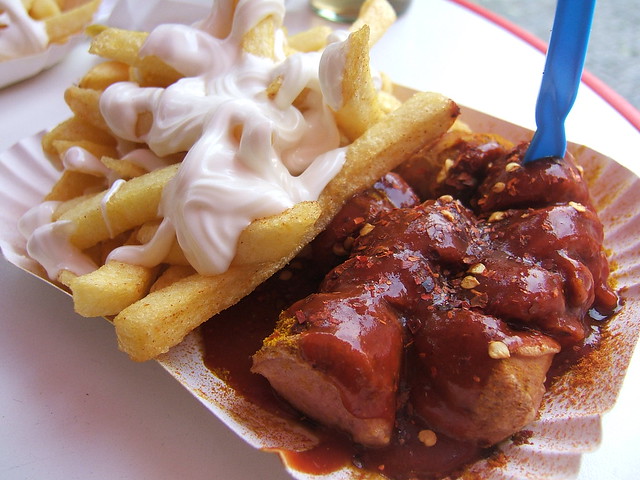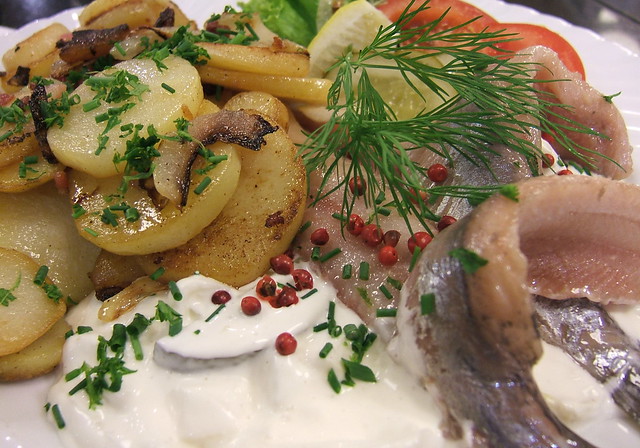Random Posts
France
Spain
UK
‹
›
Travel With Kids
USA
Travel Inspiration
Travel Tips
Berlin is a city rife with culture, history, and a bohemian attitude that takes a lot of visitors by surprise. It’s an easy city to enjoy on a budget, with plenty of free attractions to keep even the most frugal minded traveller happy.
If that’s not incentive enough to book those cheap flights, Berlin is a city bursting with great cheap eats. No matter how low your budget is, you’re sure to find some awesome food for a couple of Euros on the streets of the German capital.
Curry 36
If you’re set on seeing Berlin on a budget you’re bound to find yourself eating currywurst at least once, and you can’t say “Ich bin ein Berliner” unless you’ve sampled the wurst Curry 36 has to offer. Currywurst is steamed and fried sausage topped with curry powder and ketchup: it’s that simple, and that delicious. This little shack has queues of hungry locals in front of it night and day, and it has such a strong reputation that they’ve even launched their own range of official currywurst sauce.
Burgermeister
It’s well worth leaving your hotels in Berlin for a day out in Kreuzberg, and if it’s meaty goodness you’re looking for, look no further than underneath the U-Bahn tracks near the station. Of course, there are some vegetarian options too: the tofu burger is nice enough, but nothing can compare to the bacon laden Meistaburger. The chilli cheese fries are pretty good too.
Tadim Lamacun
Despite Angela Merkel’s declaration that multiculturalism has failed in Germany, there are some pretty great budget eats to be found once you start visiting ethnic restaurants like Tadim Lamacun, which specialises in the Turkish dish lamacun: basically a Turkish burrito. Thin flatbread is topped with minced meat, salad and sauce, then rolled into a burrito shape.
Miss Saigon
You can pick up a dish of delicious Vietnamese soup (pho) for around €6 at this modest little fast food joint. Like most great cheap foodie options, it’s popular with Berlin office workers. You might find yourself standing in a queue if you turn up at lunch time, but your first bite of the fresh, crunchy spring rolls will make it all worthwhile. Try the milkshakes, too: the coconut and avocado one sounds a bit strange, but the flavours really do work.
Back to German style food, this deli offers a lunch time platter of blutwurst, leberwurst, sauerkraut and mashed potatoes for €4.50. The sausages (blood sausage and liver sausage respectively) are somewhat of a delicacy, so if you don’t enjoy black pudding then it’s perhaps better to avoid this one and try something else on the menu, like the fried fish. If you do decide to go for it, you’ll be rewarded with a taste of real hearty German fare. Splash out on some weisbeer to cut through the rich flavours. Once you’re finished dining, browse Rogacki’s fine selection of 150 varieties of cheeses and over 200 cured meats; you’ll be spoiled for choice.
Foodies - Germany
It’s important to research and look after your health when you’re visiting a country to take part in volunteer work. Companies like Projects Abroad PRO will help find you a worthwhile project which makes use of your professional skills. However, you’ll be no use to the host country if you don’t look after your own health and wellbeing. Here is some medical advice to follow before volunteering abroad.
Vaccinations
It’s important to prepare for your volunteer project by researching what vaccinations you need for your travels. Diseases such as yellow fever, rabies and dengue fever are common in other parts of the world. You often need to get vaccinated four to six weeks in advance, so make sure you leave yourself enough time to get organised.
You may also have to start yourself on a course of malaria tablets, if you’re going to an infected area. Be sure to read the instructions carefully because some of these tablets can make you feel ill if they’re not taken with food.
Drinking water
One of the easiest ways to get ill abroad is by drinking contaminated water. In areas with poor sanitation you should never drink tap water or brush your teeth with it. Also, beware of drinking ice cubes mixed in with drinks.
Bottled water is usually very cheap so make sure you stick to drinking that. If you want to treat your own water you can boil it before drinking it, or use a chemical disinfectant, like iodine, to kill bacteria.
Foreign food
A lot of travellers end up with some form of food poisoning from eating foreign food. In some developing countries animal waste is used as fertiliser, contaminating foods growing close to the ground. If you’re in one of these countries you should avoid eating salads and uncooked fruits/ vegetables, unless you know they’ve been washed and peeled.
Be careful of any food that has been standing out in the open for a while, and steer clear of unpasteurised milk and undercooked seafood. Although food cooked from street traders can be delicious, only eat it if you’re sure it has been recently prepared and is served on clean crockery.
Extra tips
Be very careful not to let your skin burn when you’re visiting a hot country. Skin cancer is a growing problem in the UK so it’s very important that you protect yourself from the sun’s ultraviolet rays. Try and keep in the shade between 11am and 3pm or, if you’re in the sun, cover yourself up with a t-shirt, hat and sunglasses. Use the right factor sunscreen for your skin – this should be at least factor 15.
You should also take precautions against Deep Vein Thrombosis if you’re taking a long flight to get to your volunteering project. Make sure you get up from your seat and walk around to stretch your legs during the flight. Also, drink water regularly and wear loose, comfortable clothes.
It’s also very important to practice safe sex when you’re abroad. Take protection with you as the quality of condoms varies across the globe.
Travelling and taking part in a volunteering project can be a wonderful and inspiring experience so you don’t want to ruin it by not taking proper care of your health. Before you leave, make sure you know the numbers of the local hospitals and emergency services in the country you’re visiting, and research which diseases pose a threat.
Travel Tips
Subscribe to:
Comments (Atom)








